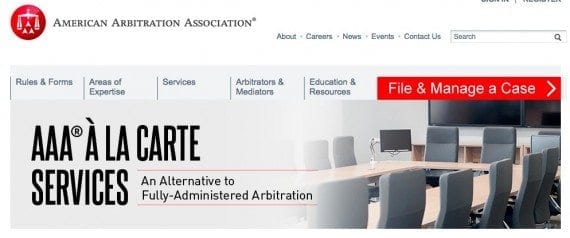
Merchants that sell on Amazon or otherwise use Amazon services agree to settle disputes with arbitration — not a jury trial — via American Arbitration Association. Merchants also agree to allow Amazon to withhold payments to the merchant at Amazon’s sole discretion.
I represent a number of sellers who utilize Amazon’s various services to increase their ecommerce sales. Though I often advise clients against relying on Amazon as their sole source of fulfillment or revenue, many of our clients do.
In some cases, those clients find themselves in a dispute with Amazon over fulfillment or payment. And, in rare cases, Amazon may simply freeze an account without prior notice or warning. In these cases, it is important to understand how a dispute with Amazon may play out.
Terms of Use Enforceable?
The first question that I usually receive from sellers in an Amazon dispute is, “Is that terms of use agreement really enforceable?” The short answer is, “Likely.”
The law draws a distinction between “clickwrap” and “browsewrap” agreements. Clickwrap agreements require some manifestation of assent before entering a service — such as checking a box, scrolling through the terms, or clicking “I Agree.”
Browsewrap agreements do not require some manifestation of assent. By using the website, the theory goes, you agree to the website’s terms. Courts vary on whether browsewrap agreements are enforceable.
But, generally speaking, courts will uphold clickwrap agreements. The key questions are whether the terms of the agreement were clearly presented to the consumer, whether the consumer had an opportunity to read the agreement, and whether the consumer manifested an unambiguous acceptance of the terms.
Amazon’s Options
The next question from sellers is typically, “What have I agreed to?” In the case of Amazon’s myriad of services, the answer is, again, “It depends.” The principal agreement applicable to business-related services is the Amazon Services Business Solutions Agreement — a clickwrap. That agreement contains numerous terms, and it is worth reading in whole if you are an Amazon seller. For purposes of this article, however, only a few are relevant.
First, Amazon has the unilateral right to withhold payment from a seller in its sole and absolute discretion. Under these terms, and in the event Amazon “determine[s] that your actions or performance may result in returns, chargebacks, claims, disputes, violations of our terms or policies, or other risks to Amazon… then we may in our sole discretion withhold any payments to you for as long as we determine any related risks to Amazon or third parties persist.” Additionally, Amazon reserves the right to withhold payment “[i]f we determine that your account has been used to engage in deceptive, fraudulent, or illegal activity….”
…Amazon has the unilateral right to withhold payment from a seller…
Second, if you disagree with Amazon’s reason for withholding payment, presuming that you can obtain that reason from Amazon, your ability to recover that money is limited. Under the arbitration clause contained within the Business Solutions Agreement, all disputes must be resolved by binding arbitration under the rules of the American Arbitration Association and its Supplementary Procedures for Consumer-Related Disputes.
Though you will have to pay to file such an arbitration claim, Amazon “will reimburse those fees for claims totaling less than $10,000 unless the arbitrator determines the claims are frivolous.” Amazon reserves the right to seek its costs and attorneys’ fees from a user if “the arbitrator determines the claims are frivolous.” An arbitration proceeding can be conducted by telephone, in writing, or in person “at a mutually agreed location.” In accepting Amazon’s agreement, a seller waives its right to a jury trial.
In accepting Amazon’s agreement, a seller waives its right to a jury trial.
If the amount of money is worth arbitrating over, the arbitration proceeding is initiated by sending a demand for arbitration to Amazon’s registered agent, CSC Services of Nevada. Once the arbitration proceeding is initiated, Amazon has an opportunity to file an answer and, if proper, a counterclaim against the seller.
The seller and Amazon will be asked to agree on an arbitrator to handle the claim. If they cannot agree on an arbitrator, the parties can strike arbitrators from a list and the American Arbitration Association will appoint an arbitrator from the remaining arbitrators on the list. Arbitrators can range in price from $300 to $700 per hour.
If the claim is less than $10,000, the dispute may be resolved in writing. If the claim exceeds $10,000, the arbitrator will conduct a hearing. Prior to the hearing, the parties will exchange copies of their evidence. A hearing typically will not exceed one day, and each party will be given an opportunity to submit evidence and prove its case. Within 14 days after the hearing, the arbitrator will issue an award, which is a final decision. Generally speaking, an arbitrator’s award cannot be appealed.
Since arbitration can be extremely expensive, and because there are risks of costs and attorneys’ fees in an arbitration proceeding, the decision to proceed with arbitration against Amazon should be considered carefully. As always, speak with an attorney before deciding a course of action in resolving an Amazon dispute.




